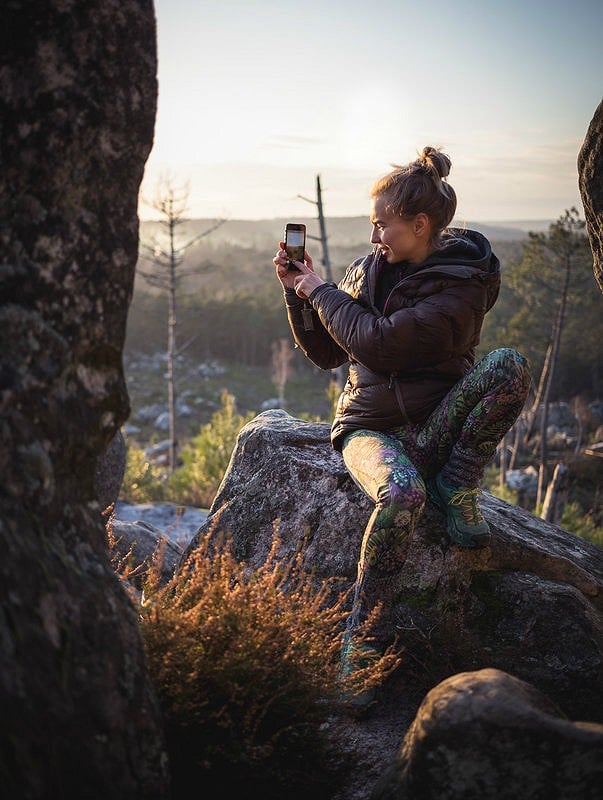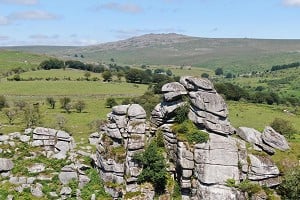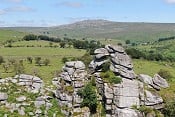
As outdoor brand marketing managers look for compelling images, is the core content of climbing achievements being cheapened? Zofia Reych makes the case for social media in the climbing world.
Those of us who remember the pre-social media era of landlines and floppy disks also remember the time when climbing was a niche and radical pastime for a bunch of punk misfits. This came right after upper class boys scaling big routes in the Himalayas stopped being cool and working class boys doing sketchy trad on the dole were all the rage.

Even after a few years of studying climbing culture at university level, my brain still churns out these stereotyped images tainted in equal measure with humour and nostalgia. My own pre-Internet encounter with climbing was as intense as it was brief and although I fell in love with the sport, I quickly grew disillusioned with the (back then) elitist community.
It seems that nostalgia is a recurring theme in contemporary climbing culture. A recent article "No Land for Pro Climbers" by the prolific Andrew Bisharat on his blog Evening Sends bemoans the advent of social media and claims that it has taken over our community, overshadowing, or even thwarting cutting-edge climbing.
The article posits that we have now arrived in an era when a decent camera and knack for marketing can make you a pro climber, living a happy life off sponsors' money. Back in the day it wasn't all that easy, Bisharat writes. The only way to attract corporate support was by accomplishing some super hard ascent (preferably sketchy) in a "creative and interesting way."
However, as I've heard from older climbers who remember the pre-Internet days well, to get a penny from anybody you still had to smile nicely, attend events and kiss the backsides of magazine editors probably with more zeal than today. How else would you tell the world about your latest cutting-edge climb? If you were a true dirtbag hiding in the woods, it's seriously unlikely that marketing managers were on your trail.
Colette McInerney: an industry professional performing on the rock and photographing climbers.
"Being prolific in climbing is getting cheap," writes Bisharat, but to my mind with this statement he fails to recognise the difference between content creation and professional sport. Of course, athletes are now expected to be even more media savvy than before, but the choice is theirs to make. Yes, to go pro you have to learn how to press Instagram's post button, but it's not that high a price for a life of travel and climbing.
There's a huge difference between a V17 climber curating their social media accounts and a V11 (or V1 for that matter) climber doing the same. Yes, both might attract corporate sponsorship, for completely different reasons, and not necessarily one easier than the other. It's unlikely, however, that anybody would be confused about their comparative climbing achievements.
If we're ready to glorify (and pay for, as sponsors do) athletic training and repeated attempts at scaling a small rock, why do we insist on belittling the work of social media professionals? To grow their audience to hundreds of thousands, influencers in any discipline hustle hard to produce and promote content. Besides, in climbing there are very few people (if any?) who live off their online presence without actually being great athletes.
Perhaps here is where the 'athlete influencer' or even 'athlete model' comes into play; a career that generally leads down different avenues to those travelled by your typical sponsored rock-wads (deals with lifestyle clothing brands and health foods over rock shoe and gear sponsorships, for example). Influencers are not impostors - they're just another facet of our sport's growing popularity. Bisharat's piece suggests that scores of undeserving posers are taking sponsorship deals away from hardcore climbers, but that's not quite what's really happening.
In every community (or, subculture, if you will) there's a whole spectrum of engagement from core participants to those on the fringe. As climbing transitions from its rogue adolescent days into a mainstream sport, the fringe is growing exponentially, while the core remains tight. Our community might be increasingly segmented, encompassing both a World Cup boulderer and a cutting edge trad climber, but it's still relatively small.
Those on the fringe will devour popular content, finding it much easier to relate to travel photos and lower grades than to "The Burden of Dreams" or a sub-two-hour ascent on El Cap. (Although these are now also beautifully represented in media while plenty of other hard stuff goes under the radar, and that's OK too.)
Paul Robinson: an example of professional media production and cutting-edge climbing going hand in hand.
Furthermore, Bisharat worries that in the flood of user generated content, we will somehow muddy the waters and confuse hard climbing for marketing, or a 5.14d for a 5.15a. Since when has keeping the media in the hands of the few ensured accuracy? Climbing has always been self-regulated and hinged on participant honesty. These days, inflated grades and egos get verified quicker than ever.
How people perceive and promote themselves is key. A climber actively claiming to be something or someone they're not is deceitful, but if an honest climber presents their achievements as they are and is deemed an appropriate ambassador by a brand, then in what way is this detrimental to others? The Internet has enabled a wider audience to create and share their own content, and top athletes should understand that in this day and age - like it or lump it - being media savvy is a catalyst for creating opportunities, whatever your level.
As Georgie Abel wrote over two years ago in her article "Confessions of a Spray Queen", just because somebody's super psyched on Facebook about their first 5.12, doesn't mean that El Cap will cease to exist. While especially in the ever-humble British climbing community this might seem like blowing one's own trumpet, is posting on social media really that much more self-obsessed than spending hours in a dingy cellar, working on your vice-grip and low body fat percentage?
If somebody's photos rub you the wrong way, put your phone down. If you want to be the best climber in the world, stop scrolling and go and search for that next king line. If the best athletes in the world were put off their ambitions by the cheap allure of social media stardom, it wouldn't speak too well of their intrinsic motivation.
Personally, if not for the 'gram I wouldn't have returned to climbing a decade after the pre-Internet community chewed me up and spat me out. It was on social media that I first saw a strong and confident female climber. It was social media that educated me about lifestyles other than the daily grind of 9-to-5. So, excuse me now, but I'll go and press the 'like' button a few times to fuel my mediocre climbing dreams. Then I'll head out to the crag, happy in the knowledge that the rock is as good today as it was in days gone by.
Zofia Reych is an occasional writer and an appreciator of lowball traversing.













Comments
WTF?
Apologies for the following? post... I normally just click back and ignore threads that I don't understand, but I can't seem to drop this one.
Do a large number of climbers actually care about this? Do they watch other climbers on Instagram and other social media? Am I missing out on something worthwhile? I just climb, and post on here to exchange useful information and talk shite with like-minded people. I can't imagine following the sort of feeds mentioned in the article, it holds no interest to me whatsoever. It's not that I'm a technophobe, far from it. Maybe I'm just a weirdo?
Whilst I like the live-and-let-live attitude, I'm afraid I think the article rather misses the mark on a few aspects:
1. "It's unlikely, however, that anybody would be confused about their comparative climbing achievements." - this isn't true, as conversations with people who dabble in climbing will quickly tell you. However, that's not really a new thing, it's certainly been the case since I started climbing, and I include myself in those who didn't know hype/fame from sends when starting out in the sport >10 yrs ago (i.e. pre-social media).
2. "If we're ready to glorify (and pay for, as sponsors do) athletic training and repeated attempts at scaling a small rock, why do we insist on belittling the work of social media professionals?" - this is a simple answer and it's because climbers are interested in climbing, not advertising. It's the same reason why I would follow a climber on instagram but not an advertising executive (or a philosopher or ... ).
3. "A climber actively claiming to be something or someone they're not is deceitful, but if an honest climber presents their achievements as they are and is deemed an appropriate ambassador by a brand, then in what way is this detrimental to others?" - I think Bishrat is railing against the mid-ground between those two, in which a climber doesn't actively claim to be something they're not, but does allow a predictable presumption to exist without preempting it, e.g. the prevalence of posting photos on hard things you've not actually done without it being clear that you've not actually done them, or posting old photos without it being at all clear that they're old.
"It was on social media that I first saw strong confident female climbers"
I hope Geraldine Taylor, Hilary Lawrence, Gill Kent etc etc don't read this!
Because that's an oxymoron?
Not to mention Angela Soper.